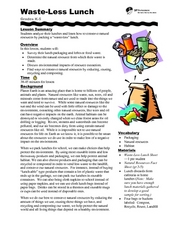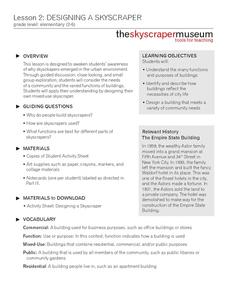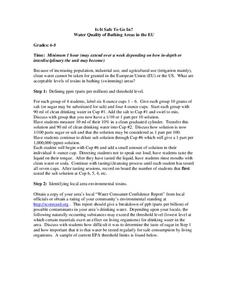Science Matters
Blubber Gloves: It’s All About Insulation
Instill the concept of adaptation with the help of Blubber Gloves—ziplock bags, shortening, and duct tape. Scholars discuss how animals and plants keep warm in polar regions, record their predictions, and try on their Blubber Gloves to...
SF Environment
Waste-Less Lunch
Is it possible to have a waste-less lunch? Can your class become leaders in conservation? Discuss the importance of reducing waste during lunch time with a fun lesson that can be extended to everyday practices. First the class examines...
Chicago Botanic Garden
Impacts of Climate Change
Scholars become experts on the eight major impacts of climate change through a jigsaw and grand conversation. They then research and present what they learned about effects specific to their region.
Science Matters
Oh Heron
Two teams—the environmentalists and herons—play four rounds of the game, Oh Heron. Using hand symbols to represent food, shelter, and water, players locate their match to produce more herons while those unmatched decompose.
Kenan Fellows
Sustainability: Learning for a Lifetime – The Importance of Water
Water is essential for life—and understanding the importance of clean drinking water is essential in understanding sustainability! Show your environmental science class the basics of water testing and treatment through a week-long...
Channel Islands Film
Natural Resources, and Human Uses of Plants and Animals
As part of their study of the restoration projects on Santa Cruz Island, class members demonstrate their understanding of the connections among plant life, animals, and the actions of humans by crafting a model that reveals these...
Science Matters
That’s An Otter Story
Young scientists discover how sea otters' habitats have changed due to human impact. Through conversation, video observation, and story reading, scholars identify how human interactions change a specific ecosystem in both positive and...
Curated OER
A River Ran Wild: An Environmental History
The Nashua River serves as the focal point of an investigation of the treatment of and care for natural resources. A reading of A River Rand Wild: An Environmental History by Lynne Cherry, launches the study and class members consider...
Deliberating in a Democracy
Recycling
How often have you passed by a recycling container in your school? Scholars research the issue of recycling in the ever-changing global world. Using documentation and video evidence, they form their own opinions on recycling and how it...
Wilderness Classroom
Pollution
Educate scholars on pollution—air, water, and land—with a series of lessons that begin with a thorough explanation of each type. Learners then take part in three activities to reinforce the importance of reducing pollution. They...
Curated OER
Recognizing Litter
When does trash become litter? Use this litter awareness lesson to help them understand the importance of trash disposal. Get learners engaged by reading Nancy Loewen's Lady Lulu Liked to Litter (not included). After discussing what...
Skyscraper Museum
Designing a Skyscraper
Besides serving as awe-inspiring monuments of human achievement, skyscrapers are built to perform a wide range of functions in urban communities. The second lesson in this series begins by exploring the history of the Empire State...
Curated OER
Print & Go ESL
Improve reading comprehension with a set of ESL worksheets. Kids read through various passages, note which facts are true or false, mark their opinion on two statements, and write a short reply based on a writing prompt.
Marine Institute
Water Pollution
Sixth graders investigate the various types of pollutants found in water and ways to help prevent water pollution. Through a hands-on experiment, students create samples of polluted water by mixing water with vegetable oil, dirt,...
WindWise Education
How Does Energy Affect Wildlife?
Is wildlife affected the same way by different electricity generation methods? Teams work together to research four electricity generation sources and their impacts on wildlife. The teams create a summary report and share their...
Chicago Botanic Garden
Accessing Prior Knowledge: Global Climate Change Survey
Begin a unit on weather and climate change by assessing prior knowledge of the topic. Learners respond to a survey with questions that ask what they think causes climate change, the effects of climate change, and if it is important...
Chicago Botanic Garden
Calculating Your Carbon Footprint
Unplugging from technology for one day per week will decrease your carbon footprint—are you up to the challenge? Part two in a series of three allows individuals to explore their personal carbon footprints. By first taking a quiz at home...
Chymist
Landfills and Recycling
Examine the nature of landfills through experimentation. Scholars build miniature landfills and monitor changes over a six-week period. Observations allow individuals to draw conclusions about the different types of trash and their...
Curated OER
Trees-Whiz
A unique series of lessons on trees is here for you. The series has learners utilize visual art, musical compositions, and literature in order to examine how trees have a place in a culture. The classic tale, The Giving Tree is one...
Curated OER
Planning a Garden Using a Grid
Third graders plan for a garden. In this garden planning lesson plan, 3rd graders investigate the use of a grid to accurately map out and plan for a vegetable garden. Students predict the space requirements for different vegetables.
Curated OER
How Solar Cells Work
Middle schoolers create electricity. In this solar energy lesson, students role play how photovoltaic cells change sunlight into electricity. Middle schoolers discuss the experiment and create their own diagram of the...
Curated OER
Conserving Water through Art!
Students study water conservation. In this water conservation lesson, students investigate the scarcity of water and determine reasons for conserving water. Students estimate how much water they use in one day and identify ways to...
Curated OER
Is It Safe to Go In? Water Quality of Bathing Areas in the EU
Using your senses, apprehend the effects of contaminants in water. With a global focus, young scientists conduct a safe experiment by tasting sugar and salt water with different dilutions. After reviewing threshold limits, learners write...
Curated OER
Hatching Chickens
Students observe chickens hatching in a classroom incubation environment In this egg-hatching lesson plan, students make observations of the hatching process and later care for the hatched chickens.
Other popular searches
- Environment Science
- Environmental Science
- Environmental Resources
- Environmental
- Environmental Health
- Human Impact on Environment
- Environmental History
- Our Environment
- Human Environment
- Environment Volunteering
- Environmentalism
- Environment Research Projects























